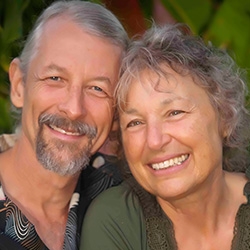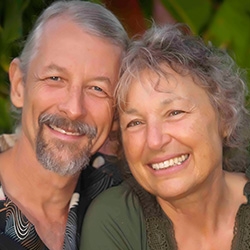
Search Results: trust
-
This exercise is most often the first activity in a beginning level workshop after the usual logistics/history/check-in. Penny Wassman experiences it as an opportunity for people to build connection with one another.
-
In this telecourse recording, expert trainer Miki Kashtan will help you uncover what prevents you from making requests for everything you want without fear. The class includes daily practices for requests skill building.
-
Ask the Trainer: "Can you share stories of transforming group conflict, or is NVC strictly intended for 'one-on-one' work?"
-
Ask the Trainer: "A participant in our beginners' NVC practice group asked the co-facilitators if there was a confidentiality agreement that was typically used in NVC practice groups?"
-
Ask the Trainer: "I've been feeling frustrated and angry quite a bit lately over very simple things. Can you help me get to the root of my hidden needs?"
-
Ask the Trainer: "I have the understanding that the unconscious is vast compared to conscious mind. When I state 'needs' how well can I depend on there being something beneath my awareness that is actually the motivation?"
-
Ask the Trainer: "In trainings I say our jackals are thoughts and now I've come to wonder if all thoughts are jackals...?"
-
Join CNVC Certified Trainers, Raj Gill and Mary Mackenzie as they explore the Nonviolent Communication process of Empathy. This audio will support people with a basic understanding of Nonviolent Communication who want to deepen their ability for empathic presence.
-
Join CNVC Certified Trainers Jori and Jim Manske in an exploration of how gratitude can enable you to remain more present moment to moment, thus enabling you to flourish in your life!
-
How can we express ourselves in a way that supports a natural flow of connection while maintaining a focus on NVC consciousness? This handout from CNVC Certified Trainer, Miki Kashtan, offers seven options that support NVC enthusiasts in evolving from classical to colloquial NVC language.
-
Trainer Tip: Have you ever noticed how often we back up when we find ourselves in a conflict? Or how much we try to pull away when someone is angry or in emotional pain?
-
Through your dialogues at home, where the stakes are often very high, you can increase your ability to meet the challenges of life everywhere with empathy, goodwill and authenticity. Please listen to this inspiring recorded telecourse with Miki Kashtan and learn how!
-
Trainer Tip: Anger can be an opportunity to hear the "Please" behind the words and create a path to resolve conflicts compassionately.
-
Can you give me advice on what to do when people won't talk to me? I find it very difficult to discover what their needs are that aren't being met! Also, how can I be effective with people who don't actually want to think about why they're being the way they are?
-
Trainer Tip: Silent empathy can be a powerful way of contributing to someone's life, giving them the gift of our presence.
-
Join CNVC Certified Trainer Dian Killian to find out how to speak up in a way that ensures you're heard, even in challenging situations.
-
Eric Bowers explains how needs and strategies correlate to different brain hemispheres, and how relaxing into our needs opens us to greater possibilities.
-
When we take a leap in life and put our hearts out into the world in new or bigger ways—sharing a song, dance, or poem, writing a book, competing at a sporting event, giving a speech, and so on—there is greater potential for aliveness but also for shame and pain
-
One of the premises in NVC is that behind all behavior and expressions are Universal Human Needs as the deeper motivators. And one of the key distinctions in NVC is that between Needs and Strategies. Try Alan Seid's exercise called "Peeling the Layers of the Onion, " a process for uncovering these needs — the deeper motivations — that underlie words and behaviors we may find disturbing or puzzling.
-
Join Eric Bowers in transforming past relationship pain, coming alive in community and creating thriving relationships. This 12 session Telecourse recording brings together Eric's passions for Nonviolent Communication, Attachment Theory and Interpersonal Neurobiology.


















